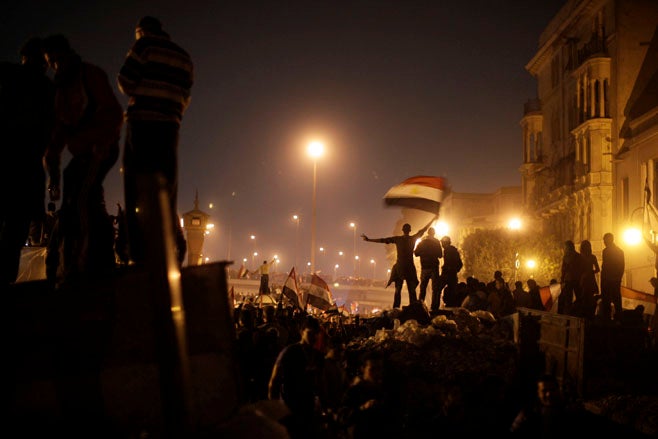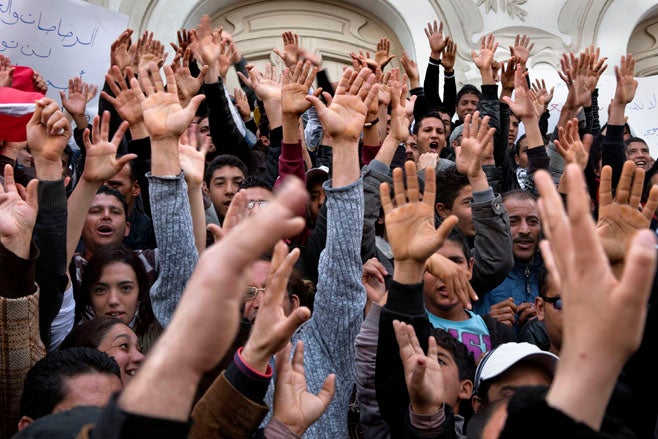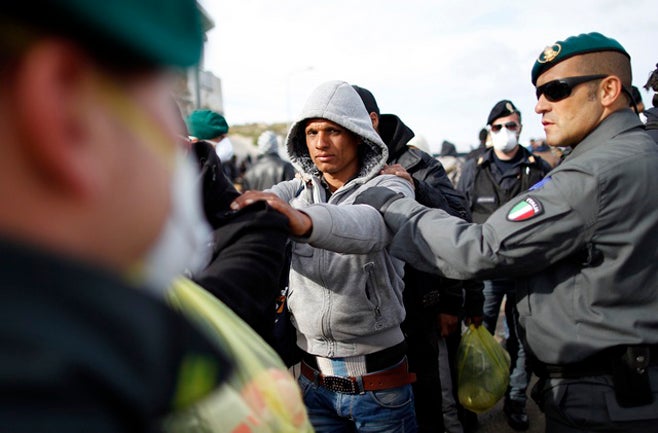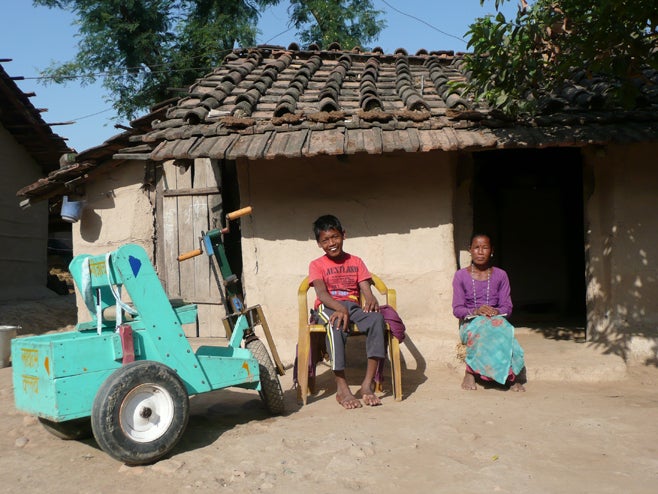Guatemala’s weak and corrupt law enforcement institutions have proved incapable of containing the powerful organized crime groups and criminal gangs that contribute to one of the highest violent crime rates in the Americas. Illegal armed groups are believed to be responsible for ongoing threats and targeted attacks against civil society actors and justice officials.
Although impunity remains the norm for human rights violations, there were significant advances for accountability in 2011, including convictions of four former officers for a notorious massacre in 1982 and the first arrest of a top-ranking official for human rights violations.
Public Security, Police Conduct, and the Criminal Justice System
Illegal armed groups and criminal gangs significantly contribute to violence and intimidation, which they use to further political objectives and illicit economic interests, including drug-trafficking.
Powerful and well-organized youth gangs, including the Mara Salvatrucha and Barrio 18, have also contributed to escalating violence. The gangs use lethal violence against those who defy their control, including gang rivals, former gang members, individuals who collaborate with police, and those who refuse to pay extortion money. They are believed responsible for the widespread killing of bus drivers targeted for extortion. According to local media, 183 bus drivers or their assistants were murdered in 2010, and 105 in the first eight months of 2011.
Mexican drug cartels, in particular the Zetas, have added to violence and lawlessness in Guatemala. In December 2010 President Alvaro Colom declared a state of siege and martial law in Alta Verapaz, a department near Guatemala’s northern border with Mexico, claiming the Zetas’s criminal activities had made the region ungovernable. The state of siege, which was renewed for a further month in January, enabled the security forces to prohibit meetings and carry out arrests and searches without warrants. However, violence by the Zetas continued. In May 2011 the group claimed responsibility for a massacre at a ranch in neighboring Petén department, in which 27 peasants were murdered in cold blood and all but two were beheaded.
Guatemala’s justice system has proved largely incapable of curbing violence and containing criminal gangs and mafias. According to official figures, there was 95 percent impunity for homicides in 2010. Deficient and corrupt prosecutorial and judicial systems and police, as well as the absence of an effective witness protection system, all contribute to Guatemala’s alarmingly low prosecution rate. In addition, members of the judicial system are routinely subject to attacks and intimidation. Despite these enormous obstacles, there were a number of successful prosecutions in 2011, due partly to the work of Attorney General Claudia Paz y Paz, and the key role played by the United Nations’s International Commission against Impunity in Guatemala (CICIG).
Police have used repressive measures to curb gang activity, including arbitrary detentions and extrajudicial killings. As part of an investigation into police involvement in extrajudicial executions in 2010 and 2011, CICIG assisted in the prosecution of two former members of the National Police’s criminal investigation division, who were sentenced in June 2011 to 25 years in prison for the enforced disappearance of an alleged extortionist in October 2009.
Accountability for Past Abuses
Guatemala continues to suffer the effects of its 36-year civil war. A UN-sponsored Commission on Historical Clarification (CEH) estimated that as many as 200,000 people were killed during the conflict. The CEH attributed 93 percent of the human rights abuses it documented to state security forces and concluded the military had carried out “acts of genocide.”
Very few of those responsible for the abuses have been prosecuted. However, 2011 saw the first arrest of a top-ranking official for human rights violations. In June Gen. Héctor Mario López Fuentes, former defense minister in the de facto government of Gen. Oscar Humberto Mejía Victores, was detained for his alleged role in massacres committed in 1982 to 1983. A judge also issued a warrant for the arrest of Mejía Victores, who seized power in a coup in 1983, but as of October 2011 he was in the hospital after having suffered a stroke, according to his lawyer.
In August 2011 a court sentenced four other former army officers to a total of 6,050 years in prison for participating in a brutal massacre in 1982 in Dos Erres, in which more than 250 people, including children, were murdered. Of 626 documented massacres, the Dos Erres case was only the fourth to have led to a conviction.
Guatemala’s first conviction for the crime of enforced disappearance occurred in August 2009, when an ex-paramilitary leader was sentenced to 150 years in prison for his role in “disappearing” individuals between 1982 and 1984. The verdict was made possible by a landmark ruling by the country’s Constitutional Court in July 2009, which established that enforced disappearance is a continuing crime that is not subject to a statute of limitations, as long as the whereabouts or fate of the victims are still unknown.
The discovery in July 2005 of approximately 80 million documents of the disbanded National Police, including files on Guatemalans killed or “disappeared” during the conflict, could play a key role in prosecutions for past human rights violations. Documents from the archive led to the arrest in March 2009 of two former National Police agents for their participation in the “disappearance” in 1984 of student leader and activist Edgar Fernando García. In October 2011 a court sentenced both men to 40 years in prison for the crime. Jorge Alberto Gómez—the former head of a unit that coordinated police and army counterinsurgency operations, who was arrested in April 2011—and ex-Col. Héctor Bol de la Cruz—the National Police’s former director, who was arrested in June—are currently facing trial for their alleged responsibility for García’s “disappearance.”
In September 2008 Congress passed the Law of Access to Public Information, which prohibits “information related to investigations of violations of fundamental human rights or crimes against humanity” from being classified as confidential or reserved under any circumstances. In March 2009 President Colom created the Military Archive Declassification Commission, tasked with sorting and declassifying military documents from 1954 to 1966. In June 2011 the government made 12,287 declassified documents publicly available. According to a commission member, 55 were kept secret on national security grounds, but could be consulted by a court if required.
Labor Rights and Child Labor
Freedom of association and the right to organize and bargain collectively are endangered by a high level of anti-union violence, including attacks on trade union offices and threats, harassment, and killings of trade unionists. The International Trade Union Confederation reported the killing of 16 trade unionists in 2009 and 10 in 2010. In May 2011 two unidentified men on a motorcycle shot and killed Idar Joel Hernández, finance secretary of the Izabal Banana Workers’ Union (SITRABI). In April Oscar González—another SITRABI official who worked at a Del Monte subsidiary in Morales, Izabal—was shot to death.
Guatemala has one of the highest rates of child labor in the Americas. The International Labour Organization reported in 2008 that 16.1 percent of children aged five to fourteen are obliged to work, many in unsafe conditions. Some of these children are employed in the construction, mining, and sex industries.
Gender-Based Violence
Violence against women is a chronic problem in Guatemala and most perpetrators are never brought to trial. According to the UN special rapporteur on extrajudicial, summary or arbitrary executions, investigations into crimes against women are often inadequate and obstructed by investigating police operating with a gender bias.
Palliative Care
Available palliative care is very limited in Guatemala, even though more than 10,000 people die of cancer or HIV/AIDS each year, many in severe pain. The government has not made oral morphine available in most of the country and has failed to ensure health care workers are adequately trained in modern pain treatment methods. Guatemala has some of the most restrictive regulatory policies in the region, discouraging doctors from prescribing pain medication and preventing patients in severe pain from accessing treatment. As a result, thousands of Guatemalans unnecessarily suffer from severe pain and other distressing symptoms every year.
Human Rights Defenders
Attacks and threats against human rights defenders are common, significantly hampering human rights work throughout the country. There is a routine failure to prosecute those responsible. In a rare exception, in July 2011 a court handed down a three-year prison sentence to a man found guilty of repeatedly threatening Norma Cruz Córdoba, director of the Fundación Sobrevivientes, a group that supports women who are victims of violence, and her coworker Gloria Ayala Pinto. The sentence was commuted to a fine.
In August 2011 four forensic experts from the Guatemalan Forensic Anthropology Foundation (FAFG) received death threats after giving evidence in the Dos Erres case. Four days earlier someone had slashed the tire of a pickup truck belonging to FAFG’s director while he was waited in traffic in Guatemala City. As of October the Attorney General’s Office had not identified those responsible for these threats.
Key International Actors
The CICIG, established in 2007, plays a key role in assisting the Guatemalan justice system in prosecuting violent crime. The commission’s unique mandate allows it to work with the Attorney General’s Office, the police, and other government agencies to investigate, prosecute, and dismantle the criminal organizations operating in Guatemala. The CICIG can participate in criminal proceedings as a complementary prosecutor, provide technical assistance, and promote legislative reforms. As of September 2011 it had initiated 62 investigations, and was directly participating in 20. The Office of the UN High Commissioner for Human Rights has maintained an office in Guatemala since 2005 that provides observation and technical assistance on human rights practices.
In January 2011 Jorge Sosa Orantes, a former army officer who faces charges in Guatemala as the commander responsible for the Dos Erres massacre, was detained in Calgary, Canada, after fleeing from the United States where he was accused of lying in an immigration application. Both Guatemala and Spain sought Sosa’s extradition on war crimes charges. In September a Calgary judge ordered that he be extradited to the US to be tried for immigration fraud.






